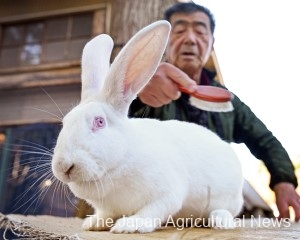Will new year bring jump in demand for jumbo rabbits?
AKITA, Jan. 9 – The year 2023 is the year of the rabbit in Japan. Speaking of rabbits, the Semboku region in the Southern part of Akita Prefecture traditionally grows jumbo rabbits for meat. In 2022, the Japanese Agency for Cultural Affairs certified its deeply rooted food culture of eating jumbo rabbit meat as a “100-year food” of Japan. Since then, there has been a jump in the popularity of rabbit meat as a healthier option.
The region grows Akita-improved Japanese White, a breed with thick white fur. Some of them weigh over 10 kilograms.
Growing rabbits for food started in the Meiji Era to improve diet in rural parts of Japan. During wartime, production increased throughout the region to meet the growing needs for food and fur. Farmers improved the breed repeatedly to what it is today, a big rabbit with a white coat, which is easy to dye.
Seiichi Takahashi is a 76-year-old leader of the small livestock producers’ group of a local agricultural cooperative (JA Akita Obako). He is a veteran farmer who has been raising rabbits for more than half a century in Misato Town, where breed improvements were particularly popular.
He feeds his rabbits with fodder for calves, timothy hay, root vegetable leaves, and scrap soybeans. The big rabbits are ready for breeding at around six months, and 5 to 8 babies are born at a time. Takahashi sometimes breeds his rabbits outside the prefecture to prevent inbreeding and protect the local breed. “Rabbit meat does not have a strong flavor. They are quiet and easy to grow. I want to encourage locals to start growing them to protect the breed unique to our region,” he said firmly.
Every October, Daisen City, home to some rabbit producers, hosts Japan Jumbo Rabbit Festival, which also serves as an annual rabbit competition. About 10,000 visitors from inside and outside the prefecture have fun touching the rabbits and eating Hinomaru Nabe, a traditional rabbit meat hot pot dish.
Daisen City has created a brand name “Nakasen-Getsuyo” for the local rabbit meat to promote the local food culture. Also, by publicizing its high nutritional value, such as high-protein and low-fat, it’s trying to make people feel more comfortable eating rabbits and increase consumption. “It’s been more than half a century since I fell in love with the white fur of rabbits, but my passion for breeding them never ends. I’ll keep going until the next year of the rabbit,” said Takahashi with a smile.
Source: http://english.agrinews.co.jp/?p=10372

